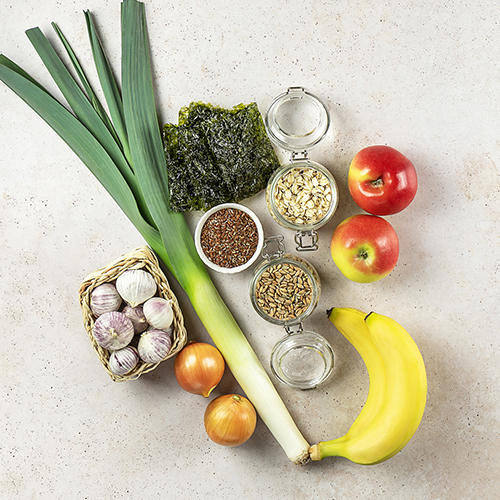I know I’m not alone in embracing the mantra “food as medicine,” but with so many suggested approaches (and the temptation of delicious baked goods), it’s hard to know what path to take. I’ve been doing more reading on the gut microbiome lately, which is both very interesting and also has an intuitive sense to it once you start diving into the science. There is no one-size-fits-all diet, because the community of gut microbes from one individual to the next varies greatly, but there are basic guidelines everyone can follow to boost gut microbes. One such guideline is to include a lot of prebiotic and probiotic foods.
Our Gut Microbiome
First, a few words about the importance of the gut microbiome. A microbiome is defined as a whole community of microbes, including bacteria, viruses, and fungi, and their overall genetic information. These microbial communities aren’t only relegated to our guts; they form in our lungs and mouths, on our skin and eyes, and in our reproductive systems. We have truly coevolved with them, and our guts are believed to have 150 times more genes than the human genome itself, which means our genes are primarily microbial. Comparatively in the world of human health, the gut microbiome has only been researched in depth for the past 15 years, and that research is still in its infancy. Experts state they might know 10% of what’s going on in our guts, but what has been discovered so far has exciting potential for human health, as it’s believed poor gut health is associated with just about every disease and health condition, from auto-immune diseases, degenerative brain diseases, IBS, and even mental health. Basically, findings are that your immune system is mostly found within your gut and your microbes are controlling it.
Eat your Plants and Fermented Foods
So what can we do as individuals to be champions for our own gut health? Eat more prebiotic and probiotic foods, a.k.a. plants and fermented foods. Prebiotics are non-digestible compounds found within our food that feed healthy gut bacteria, while probiotics are the living microorganisms found within fermented foods that aid in digestion. Prebiotic and probiotic supplements are viable options for boosting your gut microbes, but there are many foods that you can incorporate into your diet as well. There’s that broken record of “food as medicine” again.
Prebiotics
 So far, research has identified fiber as the most significant prebiotic source, but not all fiber sources are prebiotic. Soluble fiber feeds gut microbes, while insoluble fiber acts as roughage and doesn’t feed gut microbes. Most fiber-rich foods contain both. The following have been identified as especially good sources of the prebiotic fiber called inulin:
So far, research has identified fiber as the most significant prebiotic source, but not all fiber sources are prebiotic. Soluble fiber feeds gut microbes, while insoluble fiber acts as roughage and doesn’t feed gut microbes. Most fiber-rich foods contain both. The following have been identified as especially good sources of the prebiotic fiber called inulin:
- Leeks, onions, and garlic
- Sunchokes (a.k.a. Jerusalem Artichokes)
- Asparagus
- Dandelion greens
- Burdock root
- Whole wheat and rye
Creating a list of foods is a very simplified approach to an extremely complex super-organ, so it’s important to note that a wide variety of fiber rich plant-based foods, such as fruits, vegetables, nuts, seeds, legumes, and whole grains, as well as a diverse range of food colors, all contribute to a healthy gut microbiome. Dr. Tim Spector, a specialist in gut microbiome research, recommends that we try to incorporate 30 different plants into our diet each week and states the wider diversity of fiber-rich plants we eat, the happier and more diverse our gut microbiomes will be. Word to the wise: the average individual only eats half of the recommended 30 grams of fiber per day, so it’s best to gradually increase your fiber intake so as not to cause indigestion due to rapid change.
Probiotics
As mentioned previously, probiotics are fermented foods that include microorganisms that aid in digestion. Once eaten, these microorganisms can colonize your gut and increase its biodiversity and further aid in digestion. The best practice is to eat them as “small shots” daily, rather than in larger servings once a week. The most common probiotic foods include:
- Kimchi and sauerkraut
- Fermented cucumbers (different from pickles made with vinegar)
- Kefir and yogurt (though kefir tends to have more microbial diversity)
- Kombucha
- Miso
- Tempeh
- Washed-rind (stinky) cheeses
Sourdough bread has been claimed to be a probiotic food as well, and while it’s considered to be more digestible than standard white bread, any beneficial bacteria that existed in the dough has been killed during the baking process.
A few other guidelines to keep in mind when feeding your gut microbiome beyond prebiotics, probiotics, and eating the food rainbow include the following: eat foods rich in polyphenols (micronutrients that naturally occur in plants), play in the dirt (gardeners tend to have a more diverse gut microbes), limit ultra-processed foods, and avoid night snacking so the team of microbes that clean your gut each night can get to doing their important work. I suppose Michael Pollen said it most succinctly when he said “Eat food. Not too much. Mostly plants.”









